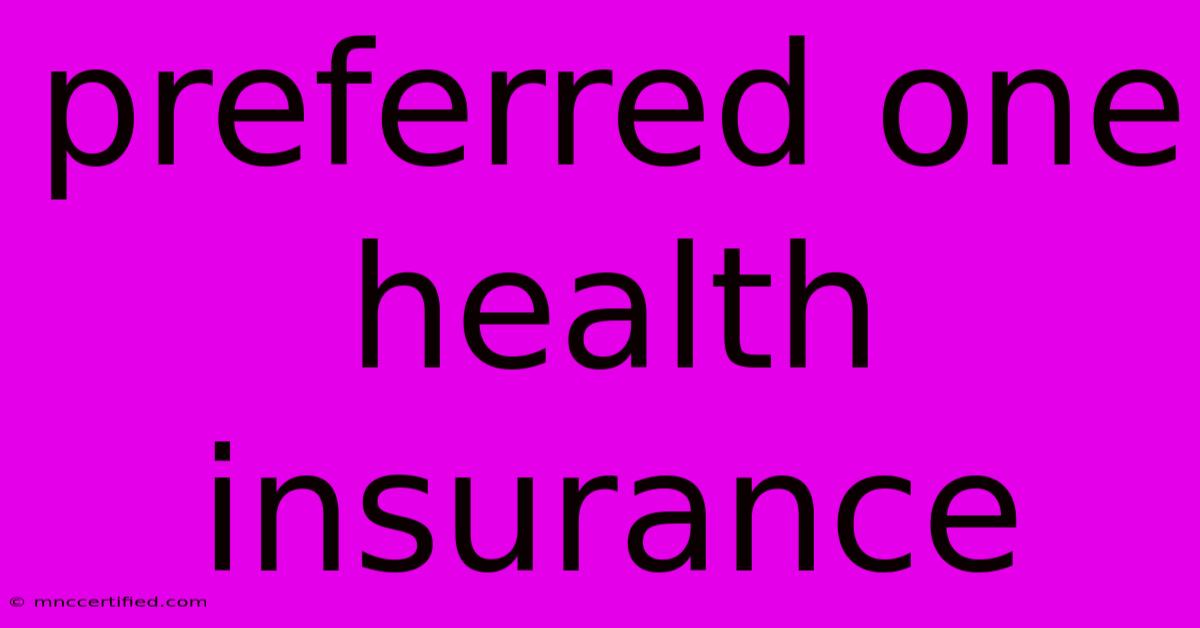Preferred One Health Insurance

Table of Contents
Decoding Preferred Provider Organization (PPO) Health Insurance: Your Guide to Choosing the Right Plan
Choosing the right health insurance plan can feel overwhelming. With so many options available, understanding the nuances of each plan type is crucial. This article focuses on Preferred Provider Organization (PPO) health insurance, breaking down its features, benefits, and drawbacks to help you decide if it's the right fit for your needs. We'll cover everything from in-network vs. out-of-network costs to deductibles and copays, ensuring you have the knowledge to make an informed decision.
What is a Preferred Provider Organization (PPO) Health Insurance Plan?
A PPO plan offers flexibility in choosing your healthcare providers. Unlike Health Maintenance Organizations (HMOs), PPOs allow you to see in-network and out-of-network doctors and specialists. However, seeing in-network providers generally results in lower costs. This network is a group of doctors, hospitals, and other healthcare professionals who have agreed to provide services at pre-negotiated rates with your insurance company.
Key Features of PPO Plans:
- Flexibility: See any doctor, in-network or out-of-network, without a referral.
- Cost-effectiveness (generally): Using in-network providers results in lower out-of-pocket expenses.
- Broad Network: PPOs typically have larger networks than HMOs, offering a wider range of choices.
- No Gatekeeper: You don't need a primary care physician (PCP) referral to see specialists.
Understanding PPO Costs: Deductibles, Copays, and More
While PPO plans offer flexibility, understanding their cost structure is essential. Here's a breakdown of common terms:
- Premium: Your monthly payment for health insurance coverage.
- Deductible: The amount you pay out-of-pocket for covered healthcare services before your insurance begins to pay.
- Copay: A fixed fee you pay for a doctor's visit or other services.
- Coinsurance: Your share of the costs of covered healthcare services after you've met your deductible.
- Out-of-pocket maximum: The most you will pay out-of-pocket in a year for covered healthcare services.
Important Note: Costs vary significantly depending on the specific PPO plan and your chosen provider. Always review the plan's Summary of Benefits and Coverage (SBC) for detailed cost information.
PPO vs. Other Health Insurance Plans: Making the Right Choice
Choosing between PPO, HMO, and other plans depends on your individual needs and preferences. Here's a brief comparison:
| Feature | PPO | HMO |
|---|---|---|
| Provider Choice | Flexible; in-network & out-of-network | Limited to in-network providers |
| Referrals | Not required | Usually required for specialists |
| Costs | Generally higher premiums, lower out-of-pocket for in-network care | Generally lower premiums, higher out-of-pocket for out-of-network care |
| Network Size | Typically larger | Typically smaller |
Finding the Best Preferred Provider Organization (PPO) Plan for You
Selecting the right PPO plan involves careful consideration of your healthcare needs and budget. Here are some tips for your search:
- Compare plans: Use online comparison tools to evaluate different PPO plans offered in your area.
- Check the provider network: Ensure your preferred doctors and specialists are in the plan's network.
- Review the SBC: Understand the plan's costs, including premiums, deductibles, copays, and coinsurance.
- Consider your health history: Choose a plan that adequately covers your expected healthcare needs.
- Read reviews: See what other people have to say about different insurance providers.
Conclusion: Navigating the World of PPO Health Insurance
Choosing a PPO health insurance plan requires understanding its features, costs, and limitations. By carefully comparing plans and considering your individual needs, you can find a plan that offers the right balance of flexibility and affordability. Remember to always review the Summary of Benefits and Coverage for comprehensive details before making a decision. Don't hesitate to contact your insurance provider or a healthcare professional if you have any questions or require further assistance.

Thank you for visiting our website wich cover about Preferred One Health Insurance. We hope the information provided has been useful to you. Feel free to contact us if you have any questions or need further assistance. See you next time and dont miss to bookmark.
Featured Posts
-
Notary Signing Agent Insurance
Nov 27, 2024
-
Ofcom Complaints Surge Controversial Star On This Morning
Nov 27, 2024
-
Where To Watch Hull City V Sheffield Wednesday
Nov 27, 2024
-
Lower Mortgage Rates Barclays And Metro Rental Changes
Nov 27, 2024
-
Valdosta Insurance Valdosta Ga
Nov 27, 2024